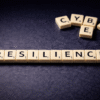
Part 2 – Top 10 More Ways to Keep Your Laptop Secure While Traveling
CYBERSECURITY + DATA PRIVACY & COMPLIANCE + BUSINESS CONTINUITY Ervin Daniels todayNovember 14, 2025

Part 2 – Lessons From the Road
I’ve learned that traveling with a laptop is like traveling with a passport; one mistake and your whole trip can take a drastic turn.
After publishing Part 1, “Top 10 Ways To Keep Your Laptop Secure While Traveling,” several readers messaged me about close calls they had experienced: one nearly lost access to their encrypted files after a charger swap in Paris, and another discovered a malicious Wi-Fi clone at an airport lounge.
So, in this follow-up, I’m sharing more lessons learned, each one drawn from a story on the road.
11. The “Free Wi-Fi” DJ Disaster — Why I Never Go Online Without My VPN
A few years ago, I was stuck at an airport with a long layover. Bored, I decided to download some free DJ software I’d been meaning to try. I connected to what appeared to be a harmless “Free Airport_WiFi” network and clicked “Download.” Within hours, strange things started happening in my Facebook account was hacked, and spam messages were being sent from my profile. That’s when I learned the hard way that free software and free Wi-Fi often come with a hidden price. The “network” I’d connected to was actually a rogue hotspot designed to harvest credentials from unsuspecting travelers. Now, I never go online without my VPN. It’s like wearing noise-canceling headphones for your data — no one can eavesdrop. Before I open my browser, the VPN is active, shielding every packet of information I send.
12. The Forgotten Update: A Hotel Wake-Up Call
During a client trip to Chicago, I postponed an operating system update because I didn’t want to reboot before a meeting. That night, a patch was released to fix a zero-day browser flaw, and my laptop was left vulnerable. Lesson learned: constantly update before you travel. Now, the night before a flight, I run all updates and even reboot twice, once at home and once at the gate, to ensure everything installs cleanly. The 10 minutes you spend patching are worth more than hours recovering from a breach.
13. The Bluetooth Bystander
In a coffee shop in Austin, my laptop suddenly paired with an unknown Bluetooth device named “Pixel-Budz”. I wasn’t listening to music; someone nearby was scanning open connections. Since then, I keep Bluetooth and file sharing off when traveling. It’s incredible how small actions, such as disabling AirDrop or network discovery, can close big doors to opportunistic attacks.
14. One Password to Rule Them All? Not Anymore.
On another trip, I shared a co-working desk with a friendly stranger who asked about my password habits. I admitted I used the same password for several logins, a rookie mistake. He laughed and showed me his password manager app. Today, every one of my accounts has a unique, complex password, and MFA is turned on. It’s the cheapest insurance policy you’ll ever buy.
15. The USB That Almost Cost Me My Project
While presenting at a client site in Toronto, someone handed me a USB drive “with updated slides.“ I plugged it in, and my antivirus immediately blocked a Trojan attempt. That moment changed my habits forever.
Now, I never plug in unverified devices. I carry my own encrypted USB drives and store backups in the cloud. Curiosity may not kill the cat, but it can certainly infect your laptop.
16. The Starbucks Close Call: Gone in a Blink
One morning at a busy Starbucks, I stepped away for just a few seconds to run to the restroom. When I came back, someone I didn’t recognize was suddenly sitting right next to my laptop, close enough to touch it. Thankfully, it was still there, but that moment hit me hard: your computer can disappear in the blink of an eye, even if you step away for only a moment. Since then, I have never left my laptop unattended. I sit with my back to a wall when possible, keep my bag secured to my chair, and store my computer in a simple, non-flashy sleeve. It’s not about being paranoid; it’s about being mindful and protecting the device that holds your entire digital life.
17. The Backup That Saved the Day
Last winter in Denver, my hard drive crashed during a presentation. Fortunately, I had a cloud backup synced nightly. Within minutes, I borrowed a colleague’s laptop and logged in to restore the files. That’s when I realized: the best travel companion isn’t your laptop, it’s your backup plan. Have a cloud or encrypted external drive ready.
18. The Unknown Text Message: A “Verification“ Trap
While traveling, a friend received a random text from an unknown number claiming there was an issue with one of his accounts and asking him to “verify your login immediately.“ The message appeared official — with its logo, tone, and even the link — but it wasn’t. The moment he clicked, his credentials were stolen, and someone attempted to access his accounts within minutes. Scams like this often strike when you’re distracted, on the move, or connected to unfamiliar networks. Now, I never click links from unknown numbers, and I rely on strong security settings and endpoint protection to block suspicious activity. Convenience is tempting, but even one careless tap can cost more than you expect.
19. The Hotel Checkout Shuffle: The Thumb Drive I Left Behind
We’ve all been there, packing in a rush, juggling chargers, cables, and last-minute calls. During a hotel checkout in Dallas, I did precisely that. In the scramble, I accidentally left a thumb drive in the nightstand drawer. It wasn’t just any drive; it contained sensitive data. Thankfully, it was fully encrypted, but the sinking feeling stayed with me. Since that day, I have kept a simple travel checklist taped inside my laptop sleeve: charger, dongles, external drive, thumb drives, and mouse. Nothing gets left behind. And when I return home, I always run a malware scan before reconnecting to my home network, just in case anything happened while I was away.
20. The Hotel Checkout Shuffle: The Thumb Drive I Left Behind
We’ve all been there, packing in a rush, juggling chargers, cables, and last-minute calls. During a hotel checkout in Dallas, I did precisely that. In the scramble, I accidentally left a thumb drive in the nightstand drawer. It wasn’t just any drive; it contained sensitive data. Thankfully, it was fully encrypted, but the sinking feeling stayed with me. Since that day, I have kept a simple travel checklist taped inside my laptop sleeve: charger, dongles, external drive, thumb drives, and mouse. Nothing gets left behind. And when I return home, I always run a malware scan before reconnecting to my home network, just in case anything happened while I was away.
The Mindset That Keeps You Safe
The biggest lesson? Security is a mindset, not a checklist. On the road, I assume every network is hostile and every public outlet could be compromised. That doesn’t mean I travel in fear; it means I travel prepared. Security isn’t about paranoia; it’s about peace of mind. When you know you’ve layered your defenses, physical, digital, and behavioral, you can enjoy the journey instead of worrying about it.
Final Boarding Call
Whether you’re traveling for business or taking that long-awaited family vacation, your laptop is the bridge between your personal world and the digital one. Please treat it with care, respect, and a healthy dose of skepticism. Security while traveling isn’t about locking everything down; it’s about staying one step ahead. So the next time you’re at an airport café, sipping coffee before your flight, remember: a little awareness goes a long way and your laptop and your peace of mind will thank you.

Written by: Ervin Daniels
About the author
Ervin Daniels
Cybersecurity Architect with over 25 years of Technology and Security leadership and hands-on experience across various industries (retail, public, financial services, and technology).
Previous post
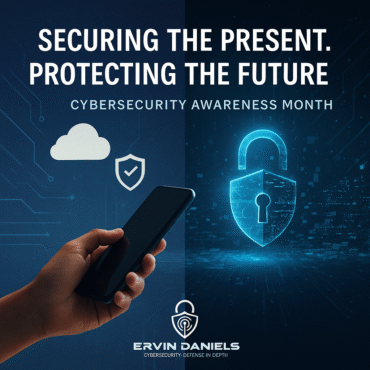
CYBERSECURITY Ervin Daniels
October is Cybersecurity Awareness Month: Securing The Present. Protecting The Future
Similar posts
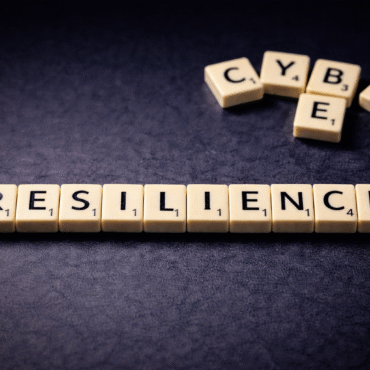
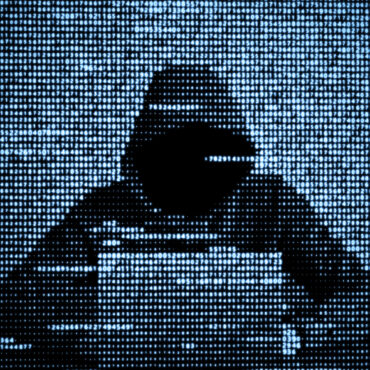
©2026 Ervin Daniels. Designed By Tru Brand Media Disclaimer: Opinions expressed are solely my own and do not express the views or opinions of IBM.


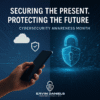





Post comments (0)